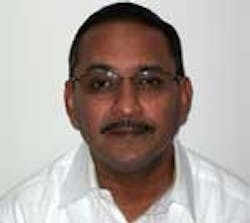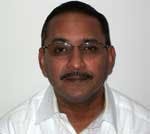A Trip Abroad
Hygienist pursues a career in exotic locations
by Judith E. Sulik, RDH, MBA
Joseph Mathews has practiced dental hygiene in Kuwait, the Arctic Circle, Labrador, and Illinois. He has aMathews' parents emigrated from India to Kuwait in 1947, and his father worked as a dental technician at one of the hospitals supporting the emerging oil industry. Initially he, too, planned to become a dental technician.
He said, "My uncle lived in Iowa. I moved there and was attending Des Moines Community College when my father suggested I consider becoming a dental hygienist. He told me it was difficult to find dental hygienists in Kuwait. I thought this was a good idea so I applied to different schools and chose SUNY (State University of New York) in Troy where I earned an associate's degree in applied science in dental hygiene.
"After I graduated, I returned to Kuwait. The country was flush with oil money, salaries were lucrative, and working conditions were excellent. My goal was to work for one of the oil company clinics, but I discovered they wanted hygienists with at least two years of experience. I found a job with the Ministry of Public Health working at the dental clinic at the main hospital just as people were becoming aware that dental health is important."
The dentists Mathews worked with had been recruited from Scandinavian countries where they had been involved with school health programs. The program in Kuwait was similar to public health dentistry in the United States.
Mathews said, "Patients were referred to the public dental clinic by the Department of Periodontology. Awareness of dental health was just beginning in Kuwait. The recruited dentists had been involved in school health programs. I performed screenings and oral health education for children and their parents, etc. Dietary habits were changing as a result of the oil boom. The people had been nomadic, but now more were being educated abroad. The old traditions were dying; people were eating a more Western diet, which meant chips and soda, so they were having more dental problems. In Arab cultures, a lot of people smoke and they have a lot of dental stain; they really liked how their teeth looked after the cleaning."
Mathews worked with one hygienist from India and one from an Arab country. He said their level of education was different from his; they were viewed as "scaling machines." He, however, continued to practice the way he was taught in Troy. While he was initially resented by the hygienists, the dentists respected and supported him.
In 1997, having obtained the necessary experience, Mathews was hired by the 4,000-employee Kuwait Oil Company. This position offered perks that U.S. hygienists cannot even imagine: a high salary, subsidized housing, 45 vacation days, and a month-and-a-half pay for every year of employment. His patients were primarily ex-patriots from the United Kingdom and Australia who were accustomed to having their teeth cared for. New patients were first seen by the dentist, and then the hygienists would provide the necessary services – perhaps a gross scaling with a return visit for the fine scaling, X-rays, and then visits with the dentist for restorative procedures. Appointments were scheduled for 30 minutes, and Mathews worked from 7 a.m. until 3 p.m.
Mathews explained that the dental clinic was attached to a company-owned hospital located about 35 miles from town. The staff would go there and provide dental treatment for the patients. Little did he realize then how invaluable that experience would prove to be.
Recall that Mathews' parents had emigrated from India. While he lived there for two years, he did not consider India home. Kuwait is an unusual country, Mathews explained, in that non-natives can stay in the country only until they retire; then they have to return to their home country. He had no interest in moving to India, so although retirement was still far in his future, he decided to explore other dental hygiene opportunities.
One day while reading the British Dental Journal, Mathews noticed an ad for a dental hygienist interested in working with the Inuit in the High Arctic in northern Canada. He had family in Ontario, and even though he was now married and the father of two children, with his wife's support, they moved to Canada. For one year, he alternated three weeks at home and three weeks away. When he was away, he would travel to communities with as few as 50 to 60 residents. The largest, he said, had only 300 residents.
Mathews said, "I was not in one place all of the time. I traveled from community to community, staying at nursing stations, spending two or three days in each place. My day was long, from 9 a.m. until 10 p.m. Every week-and-a-half to two weeks I traveled to the 'main base' in Rankin Inlet, one of the larger 300-resident communities, for supplies.
Mathews enjoyed complete autonomy in this position. He brought a portable chair and ultrasonics with him to each site. His arrival was broadcast around town so people knew to come for care. He performed scalings and applied sealants and fluoride. He did not take X-rays unless it was an emergency, in which case he would phone a doctor for advice. Sometimes he would place a temporary filling. If a root canal was needed and an abscess was present, he drained it and prescribed antibiotics until a dentist, who visited once a month along with the medical doctor, could be seen. Trauma patients were airlifted "down south."
It was 1998; he had spent a year in the Arctic Circle, so he decided it was time for a change and a return to his family. His new job with Baycrest Center for Geriatric Care in Toronto was, once again, an atypical dental hygiene experience. Baycrest is a 600-bed Jewish hospital and residence as well as a teaching facility for the University of Toronto Medical School geriatric studies program.
He said, "This was a good experience. It had both hospital-based and outreach aspects. It was very challenging. Some patients were on blood thinners, so I had to check breathing indexes. I went to assisted living sites in the neighborhood to provide dental hygiene care in the home. I brought a folding chair or wheelchair along with suction, insulin packs, dental supplies, ultrasonics, etc. When I did the outreach, an assistant accompanied me so I had help working with compromised patients, those with limited mobility, or those who arrived on stretchers. I prefer standing and rarely sit, even when a patient is not compromised. There were many challenges, and I enjoyed that. Sometimes I had to use a mouth box to keep the mouth open. Alzheimer's patients had a tendency to spit and scratch. I swabbed edentulous patients' mouths with chlorhexidine and cleaned dentures ultrasonically."
Every three months Mathews gave a lecture on oral hygiene to the facility's health-care providers. He also spent four months in Toronto working in public health for a hygienist on maternity leave, but soon it was time for another trail-blazing career opportunity, this time in Labrador, Canada.
Mathews said, "It was 2000, and my friend's friend had accepted a government contract to open a clinic for the approximately 8,000 people who live in Labrador. He was having a hard time finding an experienced dental hygienist willing to move there. I decided to be that hygienist."
Once again he left his family in more populous Toronto and left for Goose Bay, Labrador. From a financial perspective, the deal was very lucrative.
He explained, "I worked as an independent contractor, earning 50% of billings plus incentives. Typically that meant a monthly salary of $8,000 to $9,000. I traveled to coastal communities once every three months, stayed for a week, then returned to the clinic. I did this for two years before reuniting with my family and moving to Port Charlotte, Fla., where I joined my relatives' gasoline/convenience store business. But now they are divesting, and I'm ready to return to practicing dental hygiene in a setting that provides care to geriatric patients. I also believe that the 'whole patient' needs to be treated, not just the mouth. You can't build a fence across the mouth and say 'this is oral hygiene'; oral hygiene is for the whole body."
Mathews is an inspiration for all who, like him, do not want to work in private practice, prefer independence and autonomy, and are not daunted when faced with challenges. His professional life shows that if one is open-minded enough and has a supportive family, the world truly does offer unimaginable professional opportunities.
About the Author
Judith E. Sulik, RDH, MBA, is president of Finally Finished Press of Middleton, Wis. She recently published a cookbook based on Madison, Wisconsin-area restaurants. For details, contact her by e-mail at [email protected].
Past RDH Issues

